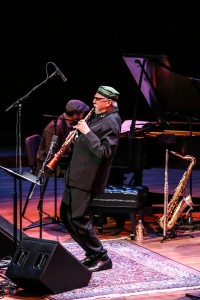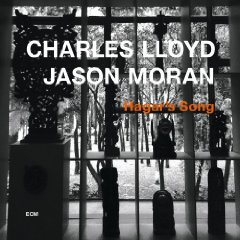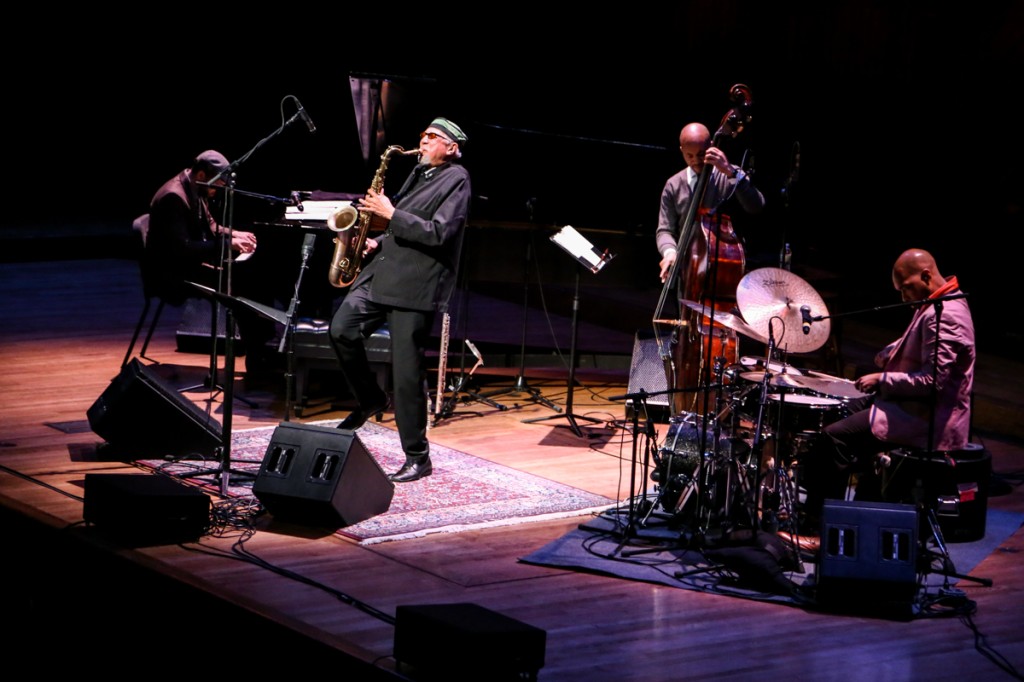Jazz Concert Review: The Charles Lloyd New Quartet — Of Sound and Silence
It turns out that it was more than just a rumor that saxophonist Charles Lloyd spent some of the ’70s playing with The Beach Boys.
Charles Lloyd New Quartet, featuring Jason Moran (piano), Reuben Rogers (bass), and Eric Harland (drums). Presented by the Celebrity Series of Boston. At Sanders Theatre, Cambridge, MA, March 21, 2013.
By Michael Ullman
To easterners at least, Charles Lloyd arrived as a surprise in 1967 with his hit album Forest Flower, which was recorded live at Monterey. We should have been better prepared: Forest Flower was the Memphis-born saxophonist’s fifth recording as a leader, and he had performed extensively with both Chico Hamilton and with Cannonball Adderley. Still, that recording and the tour that followed—I heard him in Boston in the spring of 1967—was an unprecedented breakthrough. It seemed to our Coltrane-trained ears strangely light spirited — innovative, yet perhaps a touch lightweight.
On the folksy title number, Lloyd’s even-toned tenor floated unassumingly over the rhythm section of Keith Jarrett, Ron McClure, and Jack DeJohnette. “Forest Flower” ends with an intriguingly extended coda in which Lloyd plays in a whisper. At one point, Jarrett just plucks at the strings of the piano. The music was undeniably adventurous: Jarrett and Lloyd skirted the chords in long improvisatory passages, and Lloyd would take unaccompanied solos that reminded us of Coltrane. It was also peaceful rather than volatile.
It somehow didn’t intimidate. In California, Lloyd appealed to both jazz lovers and to flower children who were open to new sounds: producer George Avakian spoke of “the love story of the Charles Lloyd Quartet and the young people of America,” many of whom “usually listen only to the pop music of high-decibel, amplified rock and folk-rock groups.” Even Lloyd’s album titles, Nirvana, Dream Weaver, Journey Within, and Love-in (with its psychedelic cover), solidified the blissed-out connection. So did Lloyd’s own statements: “I want to transform things and make this a blissful place,” he is quoted as saying on the back cover of Sound Track, which pictures him looking out over the bay. “I dream of the day when man can live in harmony. There’s still all that ugliness out there and I want to wipe it out with beauty.”
Nonetheless, though he continued to record, albeit with some obscure labels, Lloyd seemed to vanish after the late ’60s and early ’70s, re-emerging fully only in the late ’80s with his ECM contract. He is touring to celebrate his most recent disc, Hagar’s Song, consisting of duets with pianist Jason Moran. It’s an eclectic set that includes songs by Bob Dylan (“I Shall be Released”), Earl Hines (“Rosetta”), and by Brian Wilson of The Beach Boys (“God Only Knows”). It turns out that it was more than just a rumor that he spent some of the ’70s playing with The Beach Boys. The central piece of the set is a five part suite dedicated to an ancestor, Hagar, who was sold into slavery. “The suite mirrors the stages of her life; loss of family, loneliness and the unknown, dreams, sorrow, and songs to her newborn children.”
Like the disc Hagar’s Song, the powerful concert at Sanders Theatre began with two numbers associated with Ellington, Billy Strayhorn’s “Pretty Girl” and Ellington’s “Mood Indigo.” Defying his 75 years, Lloyd played tenor all over the horn. With his almost neutral tone, neither lush nor acerbic, he skated around the Strayhorn melody while still managing to evoke its beauty. He’s a virtuoso whose every note suggests the feeling behind it. Jason Moran introduced “Mood Indigo” grandly and indirectly: he can go outside the chords, come back blithely, play tightly rhythmic phrases, or suddenly sound like an Earl Hines at his wildest. At no time did he reveal that the introduction was to “Mood Indigo.” The audience laughed in recognition when the tune arrived.
On “Monk’s Mood,” the beautiful ballad by Thelonious Monk, Moran managed to avoid any hint of the master’s idiosyncratic style. He began playing a cluster of rhythmic phrases with his hands locked together—one would almost say with his fingers locked together. It was as if he was performing on a one octave piano. When his right hand suddenly flew out and hit a high note with a percussive jab, it felt like a jail break. Lloyd was equally oblique and just as impassioned.
For the rest of the performance, the quartet played a series of unannounced originals, some so new that Lloyd himself was reading the scores. He did one number on the taragato, which looks and sounds vaguely like a wooden soprano saxophone. Another highlight was a ballad on alto flute, a flowing, meditative piece with beautifully gentle chord changes. Lloyd played this one in a hush that was maintained by Moran.
Lloyd has lost none of his technique and seemingly none of his peculiarly intent fervor. His band was just as worthy. Drummer Eric Harland typically keeps the beat with a hi-hat that he barely cracks open, doubled by the ride cymbal. It’s a tightly controlled sound, his hi-hat far from the outgoing swagger Art Blakey specialized in. Soloing on one original, Harland began with a repeated rumbling on the bass drum underneath insistent chatter on the rims of his snare. It was as if he wanted to show off the part of the kit that had mostly been silent for much of the performance. Reuben Rogers plays with a large, warm sound, revolving around repeated melodic fragments.
The concert ended with a series of encores. On the last, Lloyd sat down at the piano, played a few random arpeggios, and then spoke a Buddhist poem. It was about a person who had abandoned his desires and his fears, a figure Lloyd called “illumined.” Frankly, it is hard to see how an artist could carry off being ‘illumined.’ Poet Gary Snyder was once told by a monk that the artist was the lowest form of Buddhist because he always wants to turn his illuminations into something else. But the poem explains the band’s patience, its ample use of sonic space. Several of the rhythm sections’ solos ended with a complete stop. It’s as if they are trained to peer over the lip of an abyss and listen to the silence.
Michael Ullman studied classical clarinet and was educated at Harvard, the University of Chicago, and the U. of Michigan, from which he received a PhD in English. The author or co-author of two books on jazz, he has written on jazz and classical music for The Atlantic Monthly, The New Republic, High Fidelity, Stereophile, The Boston Phoenix, The Boston Globe, and other venues. His articles on Dickens, Joyce, Kipling, and others have appeared in academic journals. For over 20 years, he has written a bi-monthly jazz column for Fanfare Magazine, for which he also reviews classical music. At Tufts University, he teaches mostly modernist writers in the English Department and jazz and blues history in the Music Department. (He plays piano badly.)
Tagged: Charles Lloyd, Charles Lloyd New Quartet, Eric Harland, Jason Moran, Reuben Rogers



